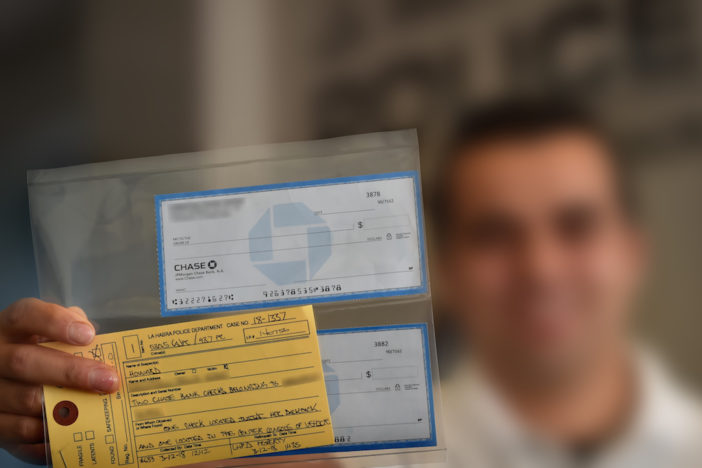As scams go, this one is pretty simple.
First, obtain a stolen check and make up a story to convince some unsuspecting soul to cash it in their name in exchange for a portion of the money.
Then, once a suspect has the money in hand and is long gone, the victim is left on the hook for the nonexistent funds when the bank comes calling.
That’s what happened, La Habra Police said, when a young female suspect convinced a woman she met on a social media website to cash two stolen checks at different banks on March 6.
“It’s very common because it’s so easy to commit,” said La Habra PD fraud Det. Mucio Sanchez, who arrested the woman after the victim reported she’d been swindled. “These suspects go online and they basically go fishing (for victims) to see who bites.
“In this case, the victim cashed one check for $1,700 at a Chase Bank branch in the City of Industry and another for $2,800 at a credit union in La Habra.”
Banks don’t necessarily cash checks for large sums up front, he said. Instead, banks make partial payments until the check clears. In this case, the woman received just $850 at the Chase Bank and $200 at the credit union in La Habra. She gave that money to the suspect, anticipating that both checks would clear, he said.
When neither check cleared, both banks informed her that she owed back the money she had received, totaling $1,050.
“Those checks were legit checks from a real account, but they were stolen and there was already fraud committed on that bank account number,” Sanchez said. “If the check bounces, it comes back to the victim, not the suspect.”
Shortly after being contacted by the suspect again, the victim called the La Habra Police Department. In an attempt to arrest the suspect, officers asked the victim to set up a meeting near the credit union.
Though the two agreed to meet again, many scammers shy away from in-person meetings to avoid identification, Sanchez said. In most cases, communication is done via text or the Internet and the money is wired to a far-off location.
“It’s usually out of the state or out of the country,” Sanchez said. “I’ve seen money sent to Africa, South America, Asia. They can give any address they want and have it forwarded to another and pick it up and there’s no way for us to track exactly where the money went.”
In this case, the woman was arrested on suspicion of grand theft and identity theft because she had several items of identification and checks belonging to other victims, Sanchez said.
Check scammers don’t seek a specific type of victim, he said, unlike IRS scams and online dating scams, which target the elderly. Sanchez said some victims are easy prey because of their naivete or immediate need for money.
He warned that people should be more vigilant when propositioned with promises of easy money.
“If it sounds too good to be true, then it’s too good to really be true,” he said.
Four common scams
Online purchase scam: Similar fraud schemes involve using stolen credit cards to make online purchases and shipping the items to an address that is not the card holder’s address.
College student scam: Another scheme that often occurs on college campuses entails convincing students to deposit stolen checks or money orders into their bank account using the ATM and to withdraw that same amount to give the suspect. The suspects pose as students and say they lost their ID and need to buy books or other necessary items.
IRS scam: Someone posing as a federal agent or IRS employee tells the caller they owe taxes and must pay over the phone or with a gift card from a retailer or they risk penalties or being arrested.
Craigslist scam: Someone offers an item for sale and the suspect offers to purchase the item, but says they need to have it shipped, and they send a check with extra funds for shipping. The victim deposits the check and sends the item to the suspect, usually in another state or country. A few days later, the seller receives notice that the check was stolen or fraudulent. These scams usually involve emails with poorly written sentences and many grammatical errors.
Tips to avoid being involved in a scam
— Never do business using checks with anyone contacted online.
— Don’t send money to a stranger in another country.
— If someone offers to give you extra money for cashing a check, remember that you never get something for nothing.
 Behind the Badge
Behind the Badge



